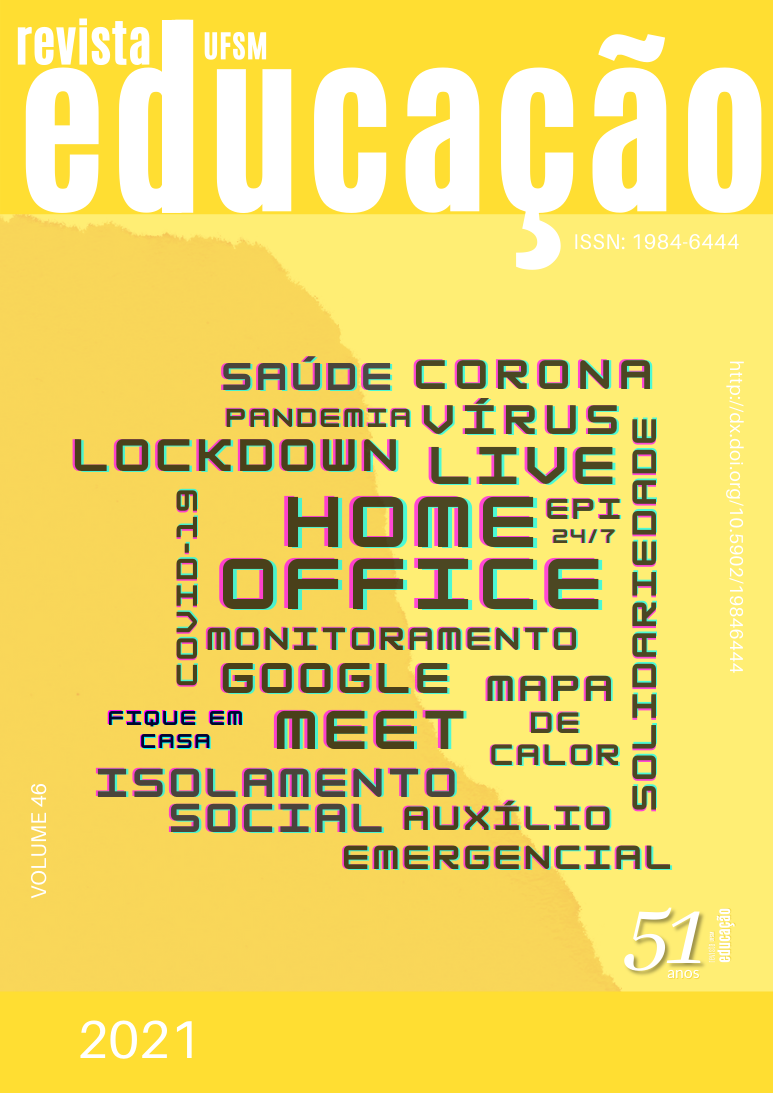Intercultural dialogue in the curriculum for the realization of Human Rights Education: possibilities and limits
DOI:
https://doi.org/10.5902/1984644439257Keywords:
Human Rights, School curriculum, Interculturality.Abstract
Human Rights Education is at the heart of the problematic of this article, given the dialogic relationship between the educational policies, curricula and perceptions of students. The dialectical method guided this research, using a qualitative approach, and included empirical research integrating the collection of perceptions more than four hundred high school students and the review of public policy documents and nine high school educational projects. The analysis of documents and perceptions of young people helps identify the fragility of learning and experience of Human Rights in Brazilian schools. Students demonstrate their expectations of Human Rights Education, requiring greater space for participation, equal treatment, freedom of expression and questioning. Human Rights Education in the curriculum would also allow a dialogue between equality and difference in the critical intercultural perspective.References
ARROYO, Miguel Gonzales. Currículo, território em disputa. 2. ed. Petrópolis: Vozes, 2011.
BARDIN, Laurence. Análise de Conteúdo. Lisboa: Edições 70, 1996.
BRÉSIL. [Constitution (1988)]. Constituição da República Federativa do Brasil. Brasília, DF: Congresso Nacional, 1988.
BRÉSIL. Decreto n. 7.037, de 21 de dezembro de 2009. Aprova o Programa Nacional de Direitos Humanos - PNDH-3 e dá outras providências. Diário Oficial da União, Brasília, DF, seção 1, p.17, 22 dez. 2009.
BRÉSIL. Plano Nacional de Educação em Direitos Humanos. Brasília, DF: SEDH/MEC/MJ/UNESCO/CNEDH, 2007.
BRÉSIL. Resolução MEC/CNE n. 01, de 30 de maio de 2012. Institui Diretrizes Nacionais para a Educação em Direitos Humanos. Diário Oficial da União, Brasília, DF, seção 1, p. 33, 30 maio 2012.
CANDAU, Vera Maria Ferrão et al. Educação em direitos humanos e formação de professores(as). São Paulo: Cortez, 2013.
CANDAU, Vera Maria Ferrão. Direitos Humanos, educação e interculturalidade: as tensões entre igualdade e diferença. Revista Brasileira de Educação, v. 13, n. 37, p. 45-56, 2008.
CARDOSO Jr, Wilson; CANDAU, Vera Maria Ferrão. Interculturalidade e ensino de artes visuais do Colégio Pedro II. Educação, Santa Maria, v. 43, n. 4, p. 721-740, out./dez. 2018.
ESPEJO, Juan Rolando Cornejo. Educación, interculturalidade y cidadania. Educar em Revista, v. 28, n. 43, p. 239-254, jan./mar. 2012.
ONU [Organização das Nações Unidas]. Conferência Mundial de Viena sobre os Direitos Humanos. Viena: Assembleia Geral da ONU.n.43, p. 239-254, 1993.
ONU [Organização das Nações Unidas]. Declaração Universal dos Direitos Humanos. New York: Assembleia Geral da ONU, 1948.
SANTOS, Boaventura de Sousa. A gramática do tempo: para uma nova cultura política. São Paulo: Cortez, 2010.
SANTOS, Boaventura de Sousa. Para uma sociologia das ausências e uma sociologia das emergências. Revista Crítica de Ciências Sociais, v. 63, p. 237-280, out. 2002.
TAPIAS, José Antônio Pérez. Educar a partir da interculturalidade: exigências curriculares para o diálogo entre culturas. In: SACRISTÁN, José Gimeno (org.). Saberes e incertezas sobre o currículo. Porto Alegre: Penso, 2013.
UNESCO [Organisation des Nations Unies pour l’Éducation, la Science et la Culture]. Programa Mundial para Educação em Direitos Humanos. Plano de Ação: Primeira Fase. 2005.
UNESCO [Organisation des Nations Unies pour l’Éducation, la Science et la Culture]. Programa Mundial para Educação em Direitos Humanos. Plano de Ação: Segunda Fase. 2012.
UNESCO [Organisation des Nations Unies pour l’Éducation, la Science et la Culture]. Programa Mundial para Educação em Direitos Humanos. Plano de Ação: Terceira Fase. 2015.
Published
How to Cite
Issue
Section
License
Declaration of originality
We declare that all articles present in the journal Educação (UFSM) are originals and were not submitted for publishing on any other publication, as a whole or a fraction. We also declare that, after being published by Educação (UFSM), a paper will not be submitted to another journal within two years. After this time, our journal transfers the publishing rights to the authors, with a permit granted by the Editorial Council.
We also acknowledge that the originals’ submission to Educação (UFSM) implies on a transference of copyright for physical and digital publishing to the journal. In case of noncompliance, the violator will receive sanctions and penalties predicted by the Brazilian Copyright Protection Law (n. 9610, dated 19/02/98).
Attribution 4.0 International (CC BY 4.0)
This license lets others remix, transform, and build upon the material for any purpose, even commercially, and copy and redistribute the material in any medium or format.

This work is licensed under a Creative Commons Attribution 4.0 International (CC BY 4.0)






